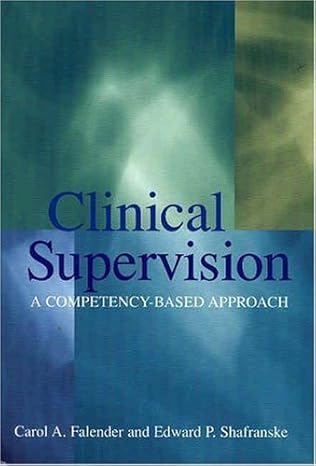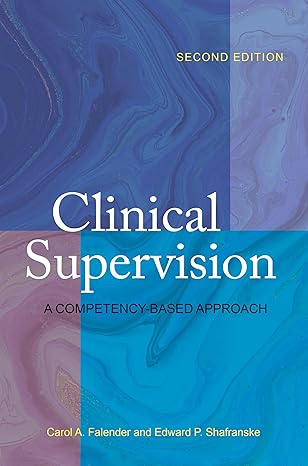封面
Clinical Supervision: A Competency-Based Approach 1 Carol A. Falender (Author), Edward P. Shafranske (Author)
Clinical supervision: A Competency-Based Approach is a resource for training and supervising mental health practitioners. Supervision has for years been central to training psychologists and other mental health professionals in clinical settings, yet supervisors have worked with little or no framework or guidance. Supervisors need no longer tolerate this state of affairs. This presentation of theory and research is tailored to contemporary practice and training requirements, with an emphasis on the identification and development of specific competencies in both trainees and their supervisors. This book guides readers through a science-informed process of supervision that clearly delineates the competencies required for good practice. The authors have geared this approach to mental health professionals who currently provide supervision in academic, training, and treatment settings as well as to students and practitioners who are studying supervision research and theory for the first time. Clinical Supervision provides guidance on both clinical and supervisory competencies and accounts for recent legislative initiatives mandating training in supervision.
Clinical Supervision: A Competency-Based Approach
Dr. Carol A. Falender PhD (Author), Dr. Edward P. Shafranske PhD ABPP (Author)
The highly anticipated second edition of Clinical Supervision is groundbreaking and science-informed, the comprehensive resource for the training and supervision of mental health professionals.
This new edition heralds the substantial progress that has taken place as competency-based clinical supervision has become acknowledged as a distinct professional competence, in keeping with the Guidelines for Clinical Supervision in Health Service Psychology (2014, 2015). Falender and Shafranske provide a unique bridge to practice for supervisors, helping them integrate the latest research findings and emerging practices into a multicultural frame. They cover key areas such as trauma-informed and assessment supervision and telesupervision, and bring empirical support, models, and research into every step of the supervision process.
This comprehensive text describes the essential knowledge, practical skills, and attitudes implicit in the supervisor competence needed to shape the practice of clinicians in training as well as professionals in all settings to enhance competence, develop their professional identity, and shape future practice. Supervisors, supervisees, training and program directors, administrators, students, thought leaders, and researchers will all benefit from this essential volume.


